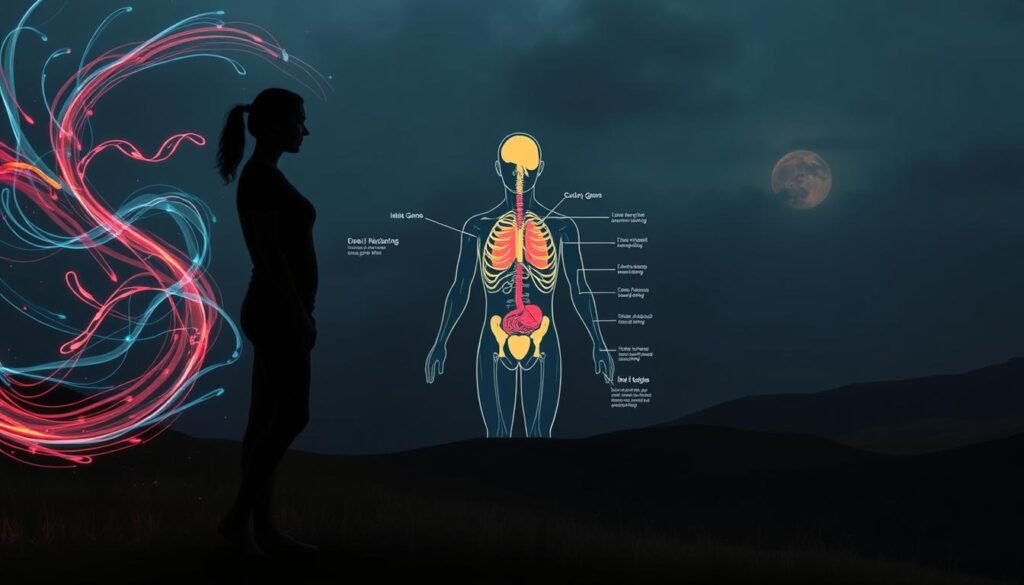For years, I struggled with finding a sustainable way to manage my weight. Like many, I tried countless diets and exercise plans, only to see temporary results. The cycle of weight loss and gain felt endless, and I wondered if there was a natural, long-term solution. This journey led me to explore the factors that make weight management so challenging, from environmental toxins to hormonal imbalances.
Current weight loss strategies often focus on quick fixes, but they rarely address the root causes of weight gain. For example, studies show that increasing fruit and vegetable intake can lead to weight loss due to their low energy density and high nutrient content1. Similarly, mindful eating practices have been linked to reduced binge and emotional eating behaviors1. These findings highlight the importance of a holistic approach.
Natural methods, such as prioritizing whole foods and mindful habits, offer a promising alternative to conventional diets. By understanding the role of factors like forever chemicals (PFAS, PFOS) and creating a sustainable system, we can work toward lasting weight control. This article explores these strategies and how they can transform your approach to health.
Key Takeaways
- Increasing fruit and vegetable intake supports weight loss due to their low energy density1.
- Mindful eating reduces binge and emotional eating behaviors1.
- High-protein diets can help reduce daily calorie intake1.
- Consuming water before meals may lower calorie intake1.
- Cardio exercises improve heart health and aid in weight reduction1.
Understanding What “Fat Forever” Really Means
Many people believe weight loss is just about eating less and moving more, but it’s far more complex. The idea of being stuck in a cycle of weight gain and loss is a reality for many. Research shows that only 1% of individuals who start as obese successfully lose weight and maintain it2. This highlights the need to rethink traditional approaches.
The Role of Forever Chemicals in Weight Gain
Forever chemicals like PFOS disrupt cellular respiration by replacing hydrogen, which affects energy production and contributes to weight gain3. These chemicals are found in everyday products and can accumulate in the body, making it harder to lose weight. Understanding this helps explain why some people struggle despite their efforts.
Conventional Versus Natural Approaches to Weight Loss
Traditional methods often focus on calorie counting and exercise, but they fail 99% of people over time2. In contrast, natural approaches prioritize whole foods, mindful eating, and addressing underlying causes like hormonal imbalances. For example, high-protein diets and fiber intake have been shown to support weight loss and improve health3.
| Method | Effectiveness | Key Insight |
|---|---|---|
| Calorie Counting | Low | Fails to address root causes2 |
| Whole Foods | High | Supports long-term weight loss3 |
| Mindful Eating | Moderate | Reduces emotional eating2 |
By understanding the science behind weight gain and adopting holistic methods, we can break free from the cycle of “fat forever.” It’s not just about willpower; it’s about creating a sustainable system that works for your body.
The Impact of Environmental Toxins on Weight Loss
The chemicals around us might be silently sabotaging our weight loss efforts. Research shows that environmental toxins, particularly PFAS and PFOS, interfere with cellular energy processes, making it harder to lose weight4. These “forever chemicals” disrupt mitochondrial function, which is essential for producing energy in the body4.

How PFAS and PFOS Disrupt Cellular Energy
PFAS and PFOS mimic fats in the body and use the same transporters, making unintended weight gain more likely4. They inhibit cellular respiration, which reduces ATP production and leaves you feeling exhausted, even during exercise4. This disruption in energy metabolism can lead to obesity and make losing weight a constant struggle5.
Uncovering the Hidden Dangers in Everyday Products
These toxins are found in everyday items like non-stick cookware, food packaging, and even drinking water4. Over time, they accumulate in the body, contributing to inflammation and weight gain4. Studies show that individuals with higher PFAS levels in their blood regained more weight after dieting, highlighting the long-term impact of these chemicals5.
“The presence of obesogens in our environment is a significant factor in the obesity epidemic.”
Understanding the role of environmental toxins is crucial for effective weight management. By reducing exposure and addressing these hidden factors, we can create a healthier path toward sustainable weight loss.
Natural Weight Loss Strategies That I’ve Discovered
Discovering natural weight loss strategies transformed my approach to health. For years, I tried quick fixes that didn’t last. But when I shifted my focus to sustainable habits, everything changed. I learned that small, consistent adjustments could lead to lasting results. Here’s what worked for me.

Integrating Diet, Exercise, and Lifestyle Changes
One of the most effective ways to lose weight is by combining a balanced diet with regular exercise. I started by adding more high-fiber foods like fruits, vegetables, and whole grains to my meals. These foods kept me full and reduced my calorie intake6. I also made sure to include protein in every meal, which helped maintain muscle and curb cravings7.
Exercise became a non-negotiable part of my routine. Instead of long, exhausting workouts, I focused on short, consistent sessions. Research shows that three 10-minute spurts of activity can be as effective as one 30-minute workout6. This approach made it easier to stick to my plan.
Small, Sustainable Adjustments for Long-Term Success
I realized that big changes weren’t necessary. Small, manageable steps made all the difference. For example, I started drinking water before meals, which helped reduce my calorie intake6. I also practiced mindful eating, paying attention to hunger cues and stopping when I felt 80% full7.
Another key adjustment was reducing added sugar. The average person consumes about 17 teaspoons daily, far more than the recommended limit6. By cutting back, I noticed a significant improvement in my energy levels and weight.
“Sustainable weight loss is about creating a system that works for your life, not just following a diet.”
These strategies didn’t just help me lose weight; they improved my overall well-being. By focusing on natural, sustainable methods, I created a system that supports my health every day.
Navigating Hormone Imbalances and Metabolic Challenges
Understanding how hormones impact weight has been a game-changer for me. For years, I focused solely on diet and exercise, only to hit plateaus. It wasn’t until I explored the role of hormones that I saw lasting results. Hormonal imbalances, like thyroid dysfunction or insulin resistance, can derail even the best efforts. Addressing these issues is crucial for sustainable weight loss.

The Critical Role of Thyroid Health in Weight Management
The thyroid plays a key role in regulating metabolism. When it’s underactive, it can slow down your resting metabolic rate, making weight loss nearly impossible8. I learned that elevated RT3 levels relative to T3 can hinder progress by slowing metabolism8. Personalized lab tests and proper medication management are essential for addressing thyroid issues. This approach helped me regain control over my weight.
Managing Insulin, Leptin, and Other Hormone Resistances
Insulin and leptin resistance are common challenges in obesity. Insulin resistance makes it harder for your body to process sugar, leading to weight gain9. Leptin resistance, on the other hand, disrupts hunger signals, making overeating more likely8. I found that improving insulin sensitivity through diet and exercise was a game-changer. Reducing added sugar and increasing protein intake helped stabilize my energy levels and curb cravings10.
“Addressing hormone imbalances isn’t just about losing weight; it’s about restoring balance to your body.”
Another strategy that worked for me was prioritizing sleep. Research shows that getting less than 8 hours of sleep can lead to increased belly fat10. By focusing on these small but impactful changes, I was able to overcome metabolic challenges and achieve lasting results.
Optimizing Your Environment for Long-Term Weight Success
Creating an environment that supports healthy habits has been a game-changer in my weight management journey. I realized that my surroundings played a huge role in my decisions, from what I ate to how active I was. By making small adjustments, I was able to build a system that worked for me, not against me.

Creating a Supportive Home and Social Setting
One of the first steps I took was redesigning my home to minimize temptations. I removed unhealthy snacks from my pantry and replaced them with fruits, nuts, and other nutrient-dense options. Research shows that having healthier foods readily available can reduce calorie intake by up to 20%11. This simple change made it easier to stick to my goals.
I also focused on my social environment. Surrounding myself with people who shared similar health goals provided motivation and accountability. Studies indicate that individuals with supportive social networks are more likely to maintain weight loss over time12. This was a key factor in my success.
Small Changes, Big Impact
Restructuring my environment didn’t require drastic measures. Here are a few strategies that worked for me:
- Meal Prepping: Planning meals in advance helped me avoid impulsive eating and stay on track.
- Active Spaces: I created a dedicated area for exercise, making it easier to incorporate physical activity into my routine.
- Mindful Eating: I set up a calm, distraction-free space for meals, which helped me focus on hunger cues and portion control.
These small changes created a more supportive atmosphere for weight management, boosting my energy level and overall well-being.
“Your environment shapes your habits. By designing a space that supports your goals, you set yourself up for long-term success.”
By optimizing my environment, I was able to maintain momentum and achieve lasting results. It’s not just about willpower; it’s about creating a system that works for your body and lifestyle.
Beyond Diet: Embracing a Holistic Weight Loss System
Shifting my focus from quick fixes to a holistic system changed everything for me. Traditional diets often fail because they ignore the bigger picture. I realized that lasting change requires more than just cutting calories—it’s about creating a system that supports your entire life.

Learning from New Research and Evolving Therapies
Emerging research has shown that chronic stress can elevate cortisol levels, leading to increased appetite and cravings for unhealthy foods13. This not only makes it harder to lose weight but also slows down metabolism, creating a cycle of frustration13. I learned that managing stress through mindfulness and low-intensity exercise is crucial for breaking this cycle13.
Another key insight was the importance of sleep. Studies indicate that getting 7-9 hours of quality sleep helps regulate cortisol levels and supports metabolism13. By prioritizing rest, I noticed a significant improvement in my energy and weight loss efforts.
My Personal Journey Toward Lasting Change
My journey taught me that small, consistent adjustments are more effective than drastic measures. For example, I started incorporating nutrient-rich foods like leafy greens and avocados, which helped regulate my blood sugar and reduce cravings13. I also reduced my caffeine intake, as excessive consumption can interfere with sleep and exacerbate stress-related weight issues13.
One of the most transformative changes was adopting a mindset focused on progress, not perfection. I stopped viewing setbacks as failures and instead saw them as opportunities to learn and grow. This shift in perspective made all the difference in my process.
“Sustainable weight loss isn’t about following a diet—it’s about creating a lifestyle that supports your health.”
By embracing a holistic approach, I was able to break free from the cycle of weight gain and loss. It’s not just about the food you eat or the exercise you do; it’s about building a system that works for your unique needs.
Conclusion
Achieving lasting weight control requires more than just willpower—it’s about building a system that works for your unique needs. Through my journey, I’ve learned that natural strategies, optimizing your environment, and addressing hormone health are key to sustainable loss.
Scientific findings show that small, consistent changes, like prioritizing whole foods and managing stress, can lead to real results14. For example, high-protein diets reduce cravings by up to 60%, making it easier to stick to your goals15. These approaches, combined with mindful habits, create a foundation for long-term success.
While the reason for weight struggles varies from person to person, the fact remains: informed, sustainable actions can transform your life. Trust in your potential and embrace change as a vital part of your journey. With the right system, lasting weight control is within reach.
FAQ
What does “fat forever” really mean?
How do environmental toxins affect weight loss?
Can diet and exercise alone lead to long-term weight loss?
How do hormones impact weight management?
What small changes can I make for sustainable weight loss?
How can I optimize my environment for weight loss success?
What role does holistic health play in weight loss?
How can I stay motivated on my weight loss journey?
Source Links
- https://www.healthline.com/nutrition/30-ways-to-lose-weight-naturally
- https://www.nerdfitness.com/blog/study-suggests-were-doomed-to-stay-fat-wait-what/
- https://bodynetwork.com/proven-habits-maintain-weight-loss-prevent-fat-regain/
- https://news.clemson.edu/what-could-be-making-you-fat-research-says-add-forever-chemicals-to-the-list/
- https://www.ewg.org/news-insights/news/toxic-chemicals-may-increase-chances-regaining-weight-after-dieting
- https://www.helpguide.org/wellness/weight-loss/how-to-lose-weight-and-keep-it-off
- https://www.menshealth.com/weight-loss/a19536817/weight-loss-tips-1/
- https://www.weightlossandvitality.com/blog/the-hormone-harmony-navigating-hormones-for-effective-fat-loss-chapter-7
- https://www.eatingwell.com/article/7917054/what-happen-to-your-hormones-when-you-lose-weight-according-to-a-dietitian/
- https://www.healthline.com/health/how-to-reset-metabolism
- https://gigharboraesthetics.com/glp-1-transforming-weight-loss-solutions/
- https://lermagazine.com/article/the-habits-of-successful-weight-losers
- https://www.drberg.com/blog/beyond-weight-loss-presentation
- https://www.restartmed.com/destined-to-be-overweight-forever/?srsltid=AfmBOoopgixjI7hMTjBZSvU19XLfNb5PkHWUcxTdqKDTmtfkqBhzD171
- https://triagemethod.com/how-to-lose-fat-and-keep-it-off-forever/






